 Society
Society

 |
| Tân Phú Trung Industrial Park in HCM City’s Củ Chi District. — VNA/VNS Photo Hồng Đạt |
HCM CITY — Air and odour pollution from industrial emissions in industrial parks (IPs) and export processing zones (EPZs) in HCM City is a persistent problem, according to the city Export Processing and Industrial Zones Authority (HEPZA).
Phạm Thanh Trực, deputy head of HEPZA’s Management Board, said the unit has submitted a report to the municipal People's Committee regarding efforts addressing pollution in IPs and EPZs.
The city currenly has 17 operating IPs and EPZs. Of these, only six have built a centralised waste treatment system.
However, issues related to air pollution, odours and untreated emissions remain, affecting both workers and nearby residential areas.
Wastewater management plays a crucial role in environmental protection in IPs and EPZs.
The wastewater generated in these zones includes domestic wastewater from daily activities within factories and worker facilities after preliminary treatment through a septic tank system, and industrial wastewater from manufacturing and production activities after on-site treatment.
This wastewater is collected and connected to the centralised wastewater treatment system within each industrial zone before being further processed.
Enterprises that generate emissions, dust and odours from boilers and incinerators have all installed treatment systems.
Domestic solid waste and industrial waste primarily generated from leftover food, carton packages and scrap paper are collected and processed according to regulations.
Most export processing zones and industrial parks citywide have installed automatic and continuous wastewater monitoring systems, and send data directly to the city’s Department of Natural Resources and Environment.
Although IPs and EPZs have been conducting environmental protection measures effectively, challenges remain during their process because of a lack of specific guidelines on reusing treated wastewater from centralised treatment systems for irrigation and street cleaning.
In addition, some businesses have not complied with environmental regulations.
Currently, pollution is mainly concentrated in air emissions and odours generated from rubber processing and tobacco production.
However, the Ministry of Natural Resources and Environment has not yet issued technical standards for odour control, making it challenging to address these issues effectively.
The city’s People's Committee has not yet issued a price list for environmental monitoring and analysis activities, which affects the bidding process for environmental quality analysis contracts, leading to authorities not collecting samples or measuring the quality of air emissions from businesses during inspections.
HEPZA will implement training sessions and awareness campaigns to instruct businesses on environmental protection laws and regulations, Trực said.
It will inspect centralised wastewater treatment systems in EPZs and IPs to ensure compliance with environmental standards.
It will also collaborate with the Project Management Board, the Ministry of Planning and Investment and the United Nations Industrial Development Organisation to continue researching, assessing and providing initiatives on policies related to eco-industrial parks. — VNS




